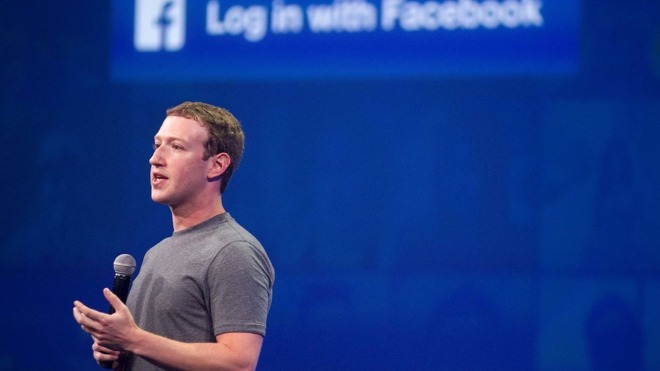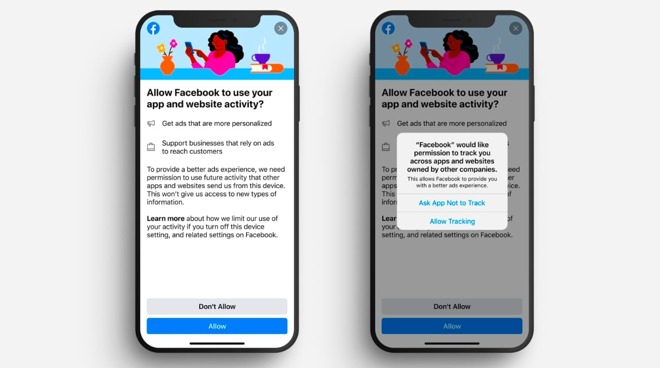Facebook's anti-Apple campaign uses misleading figures, marketers claim
Two marketing professionals have accused Facebook of using "cherry-picked" data and "disinformation" in its campaign against Apple and iOS 14's privacy features.

Credit: Facebook
As Facebook continues to claim that Apple's privacy features will be "devastating" to small businesses, the figures it quotes have come under question. Facebook is accused of using misleading data, altering figures, and spreading "disinformation."
Writing in the Harvard Business Review, two academic marketing professionals say they examined the specific claims and found multiple problems that mean numbers were overstated.
This includes Facebook's specific claim that the "average small business advertiser stands to see a cut of over 60% in their sales for every dollar."
Bart de Langhe, associate professor of marketing at Barcelona's Ramon Llull University, and Stefano Puntoni, professor marketing at Erasmus University, Rotterdam, call this figure "eye-popping." They say it comes from comparing the difference between having personalized advertising, and not.
"The problem with the 60% figure is that Facebook doesn't report anything about the two kinds of campaigns it was comparing," they write. "For all we know, they might involve different industries, different companies, different products, different times, different places -- and if they did, then Facebook's comparison wouldn't mean much.|
"In fact, it might just show that companies who knew their customers well achieved a higher return on advertising spend than companies that didn't," they continued.
The Harvard Business Review writers take particular exception to Facebook's claim that Apple's privacy move is especially damaging as it comes during the coronavirus pandemic. "Forty-four percent of small to medium businesses started or increased their usage of personalized ads on social media during the pandemic," Facebook has said, "according to a new Deloitte study."
"That number seemed off to us," write the marketing experts, "so we took a close look at the Deloitte study -- and discovered that Facebook reported the number incorrectly."
Deloitte had asked companies from nine industries whether they increased their use of personalized or targeted ads during the pandemic. "The industry with the largest increase was Telecom & Technology," reports Harvard Business Review, "but the increase was only 34%."
"Facebook, it seems, cherry-picked the data that best supported its case," they write, "and then increased the size of the cherries it picked by a third."

Facebook is already testing users' reactions to privacy tracking
The experts want to stress that they are not dismissing the concerns of small businesses, nor saying Facebook has no right to argue the case. "But disinformation about advertising effectiveness isn't the way to do that," they conclude.
Facebook has not commented on the report. However, it has recently said it will have to comply with Apple's privacy stance -- although it is claimed that Facebook is considering taking Apple to court over it.
The issue concerns the forthcoming addition to iOS 14 that will see users being asked to decide whether to allow an app to track their data use or not. Each app that wants to do this will have to ask explicit permission.

Credit: Facebook
As Facebook continues to claim that Apple's privacy features will be "devastating" to small businesses, the figures it quotes have come under question. Facebook is accused of using misleading data, altering figures, and spreading "disinformation."
Writing in the Harvard Business Review, two academic marketing professionals say they examined the specific claims and found multiple problems that mean numbers were overstated.
This includes Facebook's specific claim that the "average small business advertiser stands to see a cut of over 60% in their sales for every dollar."
Bart de Langhe, associate professor of marketing at Barcelona's Ramon Llull University, and Stefano Puntoni, professor marketing at Erasmus University, Rotterdam, call this figure "eye-popping." They say it comes from comparing the difference between having personalized advertising, and not.
"The problem with the 60% figure is that Facebook doesn't report anything about the two kinds of campaigns it was comparing," they write. "For all we know, they might involve different industries, different companies, different products, different times, different places -- and if they did, then Facebook's comparison wouldn't mean much.|
"In fact, it might just show that companies who knew their customers well achieved a higher return on advertising spend than companies that didn't," they continued.
The Harvard Business Review writers take particular exception to Facebook's claim that Apple's privacy move is especially damaging as it comes during the coronavirus pandemic. "Forty-four percent of small to medium businesses started or increased their usage of personalized ads on social media during the pandemic," Facebook has said, "according to a new Deloitte study."
"That number seemed off to us," write the marketing experts, "so we took a close look at the Deloitte study -- and discovered that Facebook reported the number incorrectly."
Deloitte had asked companies from nine industries whether they increased their use of personalized or targeted ads during the pandemic. "The industry with the largest increase was Telecom & Technology," reports Harvard Business Review, "but the increase was only 34%."
"Facebook, it seems, cherry-picked the data that best supported its case," they write, "and then increased the size of the cherries it picked by a third."

Facebook is already testing users' reactions to privacy tracking
The experts want to stress that they are not dismissing the concerns of small businesses, nor saying Facebook has no right to argue the case. "But disinformation about advertising effectiveness isn't the way to do that," they conclude.
Facebook has not commented on the report. However, it has recently said it will have to comply with Apple's privacy stance -- although it is claimed that Facebook is considering taking Apple to court over it.
The issue concerns the forthcoming addition to iOS 14 that will see users being asked to decide whether to allow an app to track their data use or not. Each app that wants to do this will have to ask explicit permission.

Comments
/s
Correct me if I'm wrong, but all Apple is really doing is letting users know how their data is being used on a screen and asking the end user to determine whether or not they want to continue allowing that specific app do xyz with their data. Why is FaceBook so concerned about that? It's like they know their business model isn't sustainable and is possibly unethical as well.
It's hard to see what percent of targeted ads do not turn off users and in that percentage, what percent of the ads turn into clicks and what percent of those clicks turn into purchases of any kind.
What Facebook truly fear here is that there is likely to be minimal impact to the majority of ad buyers: small businesses will still be able to target by topic and utilise competitor advertising products such as search engine advertising to win over shoppers. The changes will present themselves as a dip in revenue for Facebook as they will no longer be able to service very high end customers who, in combination with other data aggregators, will no longer be able to offer the creepy “over the shoulder” level of tracking.
The era of being able to surround a user with ads and track that user all the way to the individual sale is over.
so maybe a lot of the free up mom dies away and returns to customer first based on their needs and desires under their control.